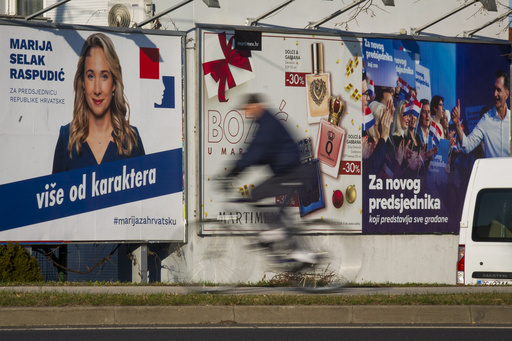
ZAGREB, Croatia — The upcoming presidential election in Croatia this weekend features the nation’s left-oriented president, Zoran Milanovi?, who has been a well-known critic of Western military involvement in Ukraine’s ongoing conflict with Russia. He faces multiple challengers, including a candidate supported by the ruling conservative government.
At the age of 58, Milanovi? is considered a front-runner in the election scheduled for Sunday. However, it is anticipated that he may not achieve a decisive victory with over 50% of the votes in the first round. If no candidate captures the required majority, a runoff election will take place on January 12, featuring the two highest vote-getters.
Milanovi?, a former prime minister, has secured significant popularity in Croatia. His confrontational approach has led to a consistent rivalry between him and current Prime Minister Andrej Plenkovi?, drawing much attention in the country’s political landscape. In anticipation of the election, Plenkovi?’s Croatian Democratic Union party has thrown its support behind Dragan Primorac, a pediatrician and professor. Primorac is campaigning on a platform of unity, contrasting with what he describes as Milanovi?’s polarizing style.
While the role of president in Croatia is largely ceremonial, the position does wield political influence and encompasses the role of commander-in-chief of the military. Milanovi? has openly criticized the EU’s stance on Ukraine, advocating for Croatia to take a neutral position amidst global conflicts, despite its memberships in NATO and the EU. He has also objected to Croatia’s engagement in NATO missions related to Ukraine, stating, “No Croatian soldier will take part in somebody else’s war.”
Primorac claims that “Croatia’s place is in the West, not the East,” but his presidential campaign has been impacted by a recent corruption scandal that resulted in the imprisonment of the health minister. This high-profile case has come to light frequently during election debates.
Political analyst Andjelko Milardovi? suggests that Milanovi?’s potential reelection would benefit Croatia’s democratic health, as the ruling party maintains substantial control over governmental institutions. “We are interested to see a balance and control of power,” Milardovi? noted. The Social Democrats, the principal opposition party, are also backing Milanovi?.
Some observers speculate that Marija Selak Raspudi?, an independent conservative candidate who is currently polling third, might pose a significant challenge to Milanovi? in a runoff situation. Previously associated with a right-wing party, Selak Raspudi? now runs as an independent and has campaigned on issues affecting ordinary citizens, such as economic hardships and the nation’s declining population of approximately 3.8 million.
Ivana Kekin, from the left-green Možemo (We Can) party, holds fourth place in polls. As the party currently governs Zagreb, she positions herself as a candidate for a new generation. Married to a respected rock musician, Kekin has accused Primorac and HDZ of engaging in corrupt practices that siphon funds from Croatia’s healthcare system.
There are four other candidates in the race, but none are favored to advance to the second round of elections. Local Zagreb resident Ilka Mati? expressed her expectation of another five-year term for Milanovi?, remarking, “there is little difference between them all.” Croatia, which became the newest EU member state in 2013, boasts around 1.6 million eligible voters.

